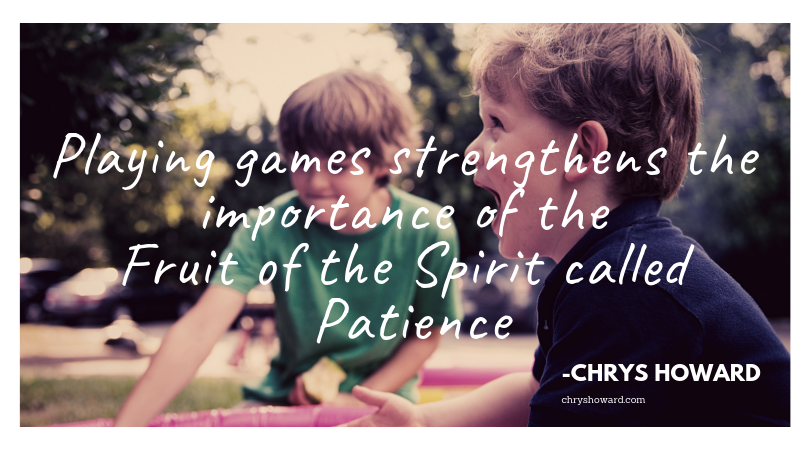Games are more than Games
Children love to hear, “Let’s play a game!” come from the mouths of their parents, grandparents, and friends. Even as older teens and young adults, my grandkids love to play games. On a recent ski vacation, they could hardly wait to get off the slopes, eat dinner, and then settle in for an evening of game playing. We are a “game playing family” and I’m here to tell you that I believe game playing is instrumental in shaping a child’s behavior. Oh, it’s not the only thing and maybe not the biggest thing, but it’s a contributing factor.
Many years ago, when my children were young, I started thinking about the games we (us old folks) grew up on. Games like Simon Says, Follow the Leader, and Mother May I. I quickly realized that games teach valuable life lessons. Simon Says teaches children to listen closely and not act hastily. Mother May I helps kids see that the adult or the leader is to be respected and it’s polite to ask permission before doing something. Follow the Leader is a natural and fun way to teach kids to listen and follow instructions.
As my children got older and advanced to games like Baseball or Basketball, Gin Rummy and Capture the Flag, I saw how games continued to teach my kids about life. I watched them negotiate life on a baseball or basketball field. I watched how they interacted with other kids and how they handled wins and losses. Then, as a mother, I was able to gently or, sometimes not so gently, guide them into better behavior if it was needed.
Back in the old days, before children starting going to pre-school at three-years-old, all the qualities I listed above were important skills to have mastered before a child went to school. Prior to the 1970’s, many children didn’t even go to kindergarten. (I didn’t.) Mothers were intent on teaching children to listen to adults and to be able to follow instructions so they would be ready for school. While mothers of the 1950’s and 60’s weren’t all about playing games, they were about having children who were respectful. Before learning our ABC’s, our mothers wanted us to be able to follow instructions, be kind and respectful, and listen to the teacher. A google search of game origins doesn’t bring up much, but I did find that Mother May I probably dates back to the 1700’s. Apparently, Shakespeare uses the phrase in one of his works. In any case, I believe these games were invented to teach children many life skills and, probably, by some very creative moms.
I want to challenge you to have a family game night. If your children have never shuffled a deck of cards or played Simon Says, it’s time to start. Even though I have already listed some benefits, if you’re still not convinced, here’s a list of added benefits to playing games.
- Playing games teach that rules have value and purpose. I think the number one thing games teach children is that rules are not made out of some kind of hateful arbitration; rules are made so that everyone can function in the game peacefully. As a parent and grandparent, I am aware that my job is to raise functioning adults who contribute to the world, not take from it. Understanding the importance of rules plays a big part in getting along with the other members of society. I have found that even the rule-breaker personalities will be the first to ask “What’s the rules?” when a new game is introduced. This is because everyone wants to understand the boundaries of the game. Boundaries create the space we can operate in and, actually, give us more freedom and security. When a game doesn’t have rules or boundaries, no one is happy. Life is the same. You can draw your own conclusions here, but think about life with no rules. Crazy!
- Playing games teach the valuable lesson of taking turns. Life in any society cannot function without this important rule. The street to our house is currently undergoing major construction to include four new round-a-bouts. It is imperative that everyone driving on that road knows how to take turns. You can start teaching that lesson now with a simple game of Go Fish or Memory. Everyone has to take a turn.
- Playing games reinforce the lesson that some people and some days are winners and some are losers. Life, for any of us, will not be one constant WIN. That would be awesome, but it’s not accurate. Learning how to handle defeat and success graciously is a skill your child will use throughout his or her life. You can start teaching that at age three with some simple games.
- Playing games strengthen the importance of that fruit of the spirit called patience. I’ve watched my littles as they got up on their knees in eager anticipation of playing a card or rolling the dice, but had to wait while the person in front of them played first. In that simple gesture of waiting, they were learning that others have value to and waiting for their turn is an important part of life. Game playing strengthens the gift of patience.
- Playing games teach problem solving skills. Let’s face it, life is one big problem. From choosing the clothes you wear each day to what to eat to where you will go to college to what to study to whether to turn right or left and on and on and on. We don’t even realize how many problems we solve in one day; it’s a normal part of life. Games teach children how to look at a situation and solve the problem to bring a successful outcome. And, even if the solution didn’t bring the outcome they wanted, it still taught a lesson. I recently watched my grandson in a tennis match. He made a mistake while playing close to the net. I wanted to tell him how to correct that mistake, but grandparents yelling for the sidelines is frowned upon. (Who knew?) In any case, the next time a ball came to him at the net, I saw him make the adjustment and he returned it perfectly. He solved his own problem. That little act in a tennis match will help him know he can solve the problems life throws his way.
In 2019, I have a concern that children are not playing enough games. I know, that sounds crazy, because what kid doesn’t play games? Well, lots of them. In fact, as a youth leader at church, former school teacher, and a camp director, I am shocked at how many kids have never played a game. I recently met a college student who had never shuffled cards. What!! I could shuffle cards at eight years old! Because, when I was eight, there wasn’t anything else to do when the cousins got together than play cards or Monopoly or Guess Who? Today’s child has many other options, and some good ones, but don’t underestimate the value of good, old fashioned games.
Pick a night. Pick a game. And PLAY!
Hugs, Chrys


